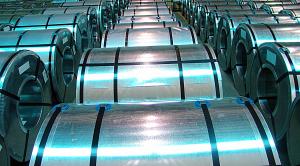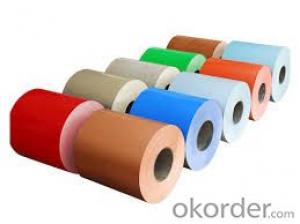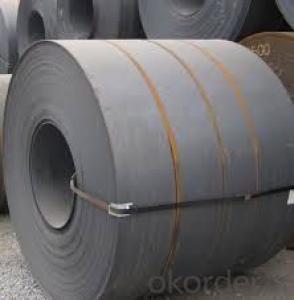GALVANISED STEEL IN COIL
- Loading Port:
- China Main Port
- Payment Terms:
- TT OR LC
- Min Order Qty:
- -
- Supply Capability:
- -
OKorder Service Pledge
OKorder Financial Service
You Might Also Like
Product Description:
product information:
The Galvalume is a kind of coated steel coil/sheet. With the cold rolled steel of different strength and thickness as substrate, it is produced through applying Al-Zn coat on both faces by hot dip process. In its coating, Al accounts for about 55%, Si 1.6%, while the remaining is Zn. It enjoys both the physical protective feature and durability of Al and the electrochemical protective property of Zn. And its surface has bright silver color and regular embossed-like figure, which are highly decorative.
Specification
1. Thickness: 0.3-0.7mm
2. Width: 914-1250mm
3. Inner Diameter: 508-610mm
4. Weight of Steel Coil: 3-15MT
5. Coating Type: Al-Zn Alloy
6. Available Dipped Layer: 50-150g/m2
7. Surface Finish Structure: Normal Spangle & Small Spangle & Zero Spangle
8. Available Surface Treatment: Passivating & Oiling & AFP & Filming
Mechanical Properties
Grade | Tension Test | ||
Yield Strength (MPa) | Tensile Strength (MPa) | Elongation% No Less Than | |
A80mm | |||
DX51D+AZ | 140-350 | 270-500 | 22 |
DX52D+AZ | 140-300 | 270-420 | 26 |
DX53D+AZ | 140-260 | 270-380 | 30 |
Application
1. Architecture Roofs and outside walls of civilian and industrial buildings, garage doors, fencings and window blinds
2. Appliances Industry Outer clad sheets for washing machine, refrigerator, television, air conditioner and ventilation system, explosion-proof strip, solar water heater and appliance parts
3. Auto Industry Muffler, heat shields of exhaust pipe and catalytic converter, auto parts & accessories under the frame, signboard in highway
4. Industrial Instruments Electric control cabinet, industrial refrigeration equipment, automatic vending machine
- Q:What are the industries that consume the most steel?
- I'm guessing manufacturing
- Q:I should have known, but magnets don't stick to stainless steel, so now I'm at a loss, I can't display my photos on the fridge. any ideas?
- An Italian theme would be great for that or just sleek clean lines with the colors stainless steal, red, and accented with black. I like that personally. But it is up to you and what you like and don't like. You could also go an Asian theme. That would be pretty. Asian stuff seems to lean toward reds, greens, and neutrals.
- Q:What is the maximum width of galvanized steel strip, please? The galvanized coat is 275, and how long is one coil?
- As far as I know, the galvanized rolls of WISCO are wider in width than other domestic steel mills, and can produce 2080 wide steel coils.
- Q:Project for school, we're learning about periodic elements and we have to choose an item from our hobbies to research what its made of. Any ideas on steel guitar strings??
- Steel is usually mainly made up of Iron (Fe) element, but it can also include Carbon (C) for a stronger steel or Nickel (Ni) for stainless steel.
- Q:I have a set of Stainless steel pots and pans. Everything is sticks to them. What must I do so things don't stick?
- Stainless is great for many things but not so great for some others. Where you want sticking is when you saute meat. You want those crusty brown bits that when the pan is deglazed are the makings of a great sauce. Get yourself one or two non stick pans (preferably with a metal handle so it can go from stove top to oven). Use those where you wish to avoid sticking (like eggs / omelets, french toast or pancakes. Keep in mind that no one pan type is universally good for all types of cooking. My kitchen is mostly stocked with layered stainless steel. I have a few non-stick skillets, a carbon steel wok, a few cast iron skillets, an enameled cast iron dutch oven (le creuset), and a copper sauce pan. Each has its own use.
- Q:How long do steel coils typically last?
- The durability of steel coils is known to last for decades, as it is influenced by various factors including the quality of the steel, maintenance and care, as well as the specific application they are used for. The design of steel coils is generally focused on ensuring longevity by being resistant to corrosion. When properly cared for, regularly maintained, and used within recommended guidelines, steel coils can have a lifespan ranging from 20 to 50 years or more. However, external factors like exposure to harsh environments, extreme weather conditions, and the level of stress they endure can impact their longevity.
- Q:How are steel coils inspected for surface defects?
- Steel coils are inspected for surface defects using various methods such as visual inspection, magnetic particle testing, eddy current testing, and ultrasonic testing. These techniques help identify any imperfections or flaws on the surface of the steel coils, ensuring they meet quality standards before they are further processed or shipped to customers.
- Q:What are the environmental benefits of using steel coils?
- There are several environmental benefits associated with using steel coils. Firstly, steel is a highly recyclable material. Steel coils can be easily recycled and repurposed into new steel products, reducing the need for mining and extraction of raw materials. Recycling steel also requires less energy compared to producing it from scratch, resulting in lower greenhouse gas emissions and a smaller carbon footprint. Additionally, steel is known for its durability and longevity. When used in construction or manufacturing applications, steel coils can last for decades without losing their structural integrity. This reduces the need for frequent replacements, which in turn reduces the consumption of resources and energy required for production. Furthermore, steel is highly resistant to corrosion and weathering, making it a suitable choice for outdoor applications. This resistance to decay means that steel coils can withstand harsh environmental conditions and maintain their functionality for extended periods. This reduces waste generation and the associated environmental impacts of replacing damaged or deteriorated materials. Lastly, steel is a versatile material that can be used in a wide range of industries and applications. Its versatility allows for efficient use of resources, as steel coils can be easily adapted and customized to meet specific project requirements. This versatility also enables the use of steel in sustainable building designs, such as energy-efficient structures or green buildings that incorporate renewable energy systems. In conclusion, the environmental benefits of using steel coils include their recyclability, durability, resistance to corrosion, and versatility. By choosing steel coils for various applications, we can contribute to resource conservation, reduced carbon emissions, and a more sustainable future.
- Q:Which one would be stronger? And should damascus steel be tempered?Thank You
- it depends on so many factors first of all is it functional damascus steel or can you see the grain? what type of carbon steel is it generally most makers use1045- 1060 a good quote of something I read was asking what steel is best for a sword is like asking how long string should be generally if they say carbon steel and do not say what grade it is they mean 1045 meaning it has 4.5 carbon content now this if properly tempered can make a good sword but it would not be known for it's durability or it's edge retention it would be average at these things as for damascus steel well as I said before it is just any steel that has been folded some people think it has magical properties imparted by the folding process but it is just steel there is slightly a higher chance of a damascus steel sword having deposits of impurities along the blade and at cheaper blades this risk is even higher that being said many good swords made of damascus on the market are very good quality any sword no matter if it is made of damascus, carbon, spring. or tool steel should be tempered always no question about that
- Q:How do steel coil manufacturers handle international shipping requirements?
- Steel coil manufacturers handle international shipping requirements by ensuring that their products meet the necessary standards and regulations for transportation. This includes adhering to specific packaging requirements, such as utilizing appropriate containers and securing the coils to prevent damage during transit. To meet international shipping requirements, manufacturers also need to comply with customs regulations and documentation. They must prepare accurate and complete paperwork, including commercial invoices, packing lists, and bills of lading, to facilitate smooth customs clearance procedures. Moreover, steel coil manufacturers often work with freight forwarders or shipping agents who specialize in international logistics. These professionals have extensive knowledge of shipping regulations, routes, and carriers, and can assist in arranging transportation, negotiating freight rates, and handling all necessary paperwork. Manufacturers may also opt to use intermodal transportation, which involves utilizing multiple modes of transportation, such as trucks, trains, and ships, to transport their steel coils. This allows for more efficient and cost-effective shipping, especially for long-distance or international shipments. Additionally, steel coil manufacturers may consider insurance coverage to protect their products during transit. Insurance can provide financial compensation in case of any damage, loss, or delays during the shipping process. Overall, steel coil manufacturers handle international shipping requirements through careful planning, compliance with regulations, collaboration with experts in logistics, and consideration of various transportation options. This helps ensure that their products reach international destinations safely, on time, and in compliance with all relevant regulations.
1. Manufacturer Overview |
|
|---|---|
| Location | |
| Year Established | |
| Annual Output Value | |
| Main Markets | |
| Company Certifications | |
2. Manufacturer Certificates |
|
|---|---|
| a) Certification Name | |
| Range | |
| Reference | |
| Validity Period | |
3. Manufacturer Capability |
|
|---|---|
| a)Trade Capacity | |
| Nearest Port | |
| Export Percentage | |
| No.of Employees in Trade Department | |
| Language Spoken: | |
| b)Factory Information | |
| Factory Size: | |
| No. of Production Lines | |
| Contract Manufacturing | |
| Product Price Range | |
Send your message to us
GALVANISED STEEL IN COIL
- Loading Port:
- China Main Port
- Payment Terms:
- TT OR LC
- Min Order Qty:
- -
- Supply Capability:
- -
OKorder Service Pledge
OKorder Financial Service
Similar products
New products
Hot products
Hot Searches
Related keywords





























